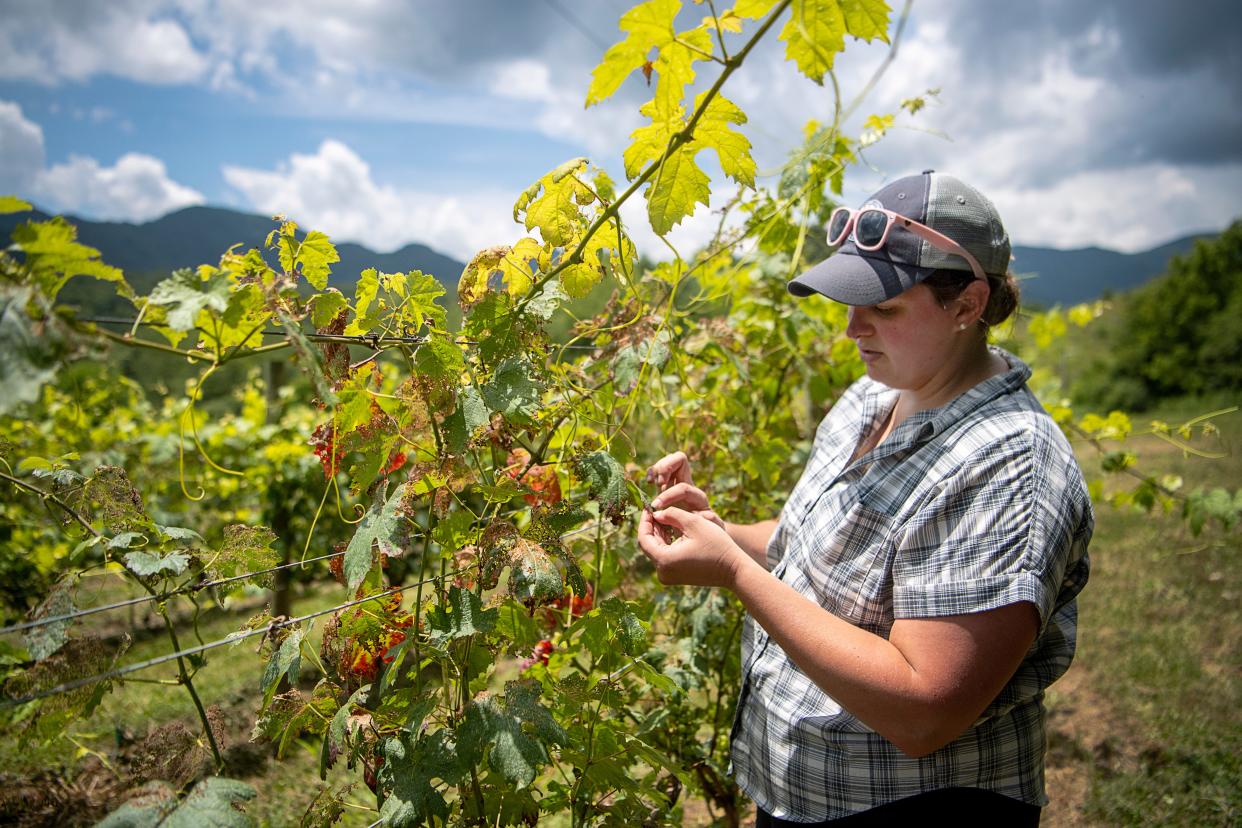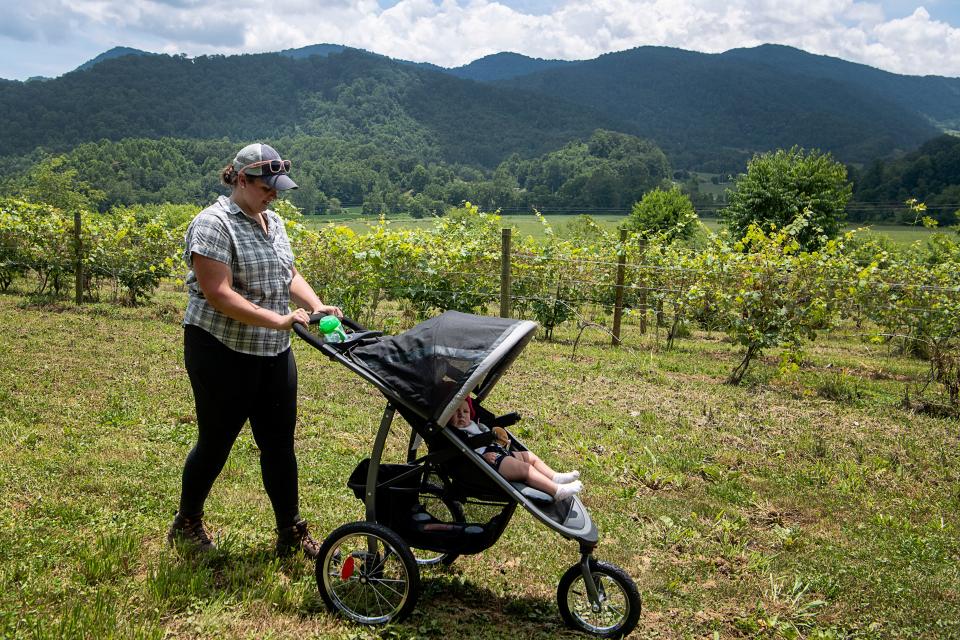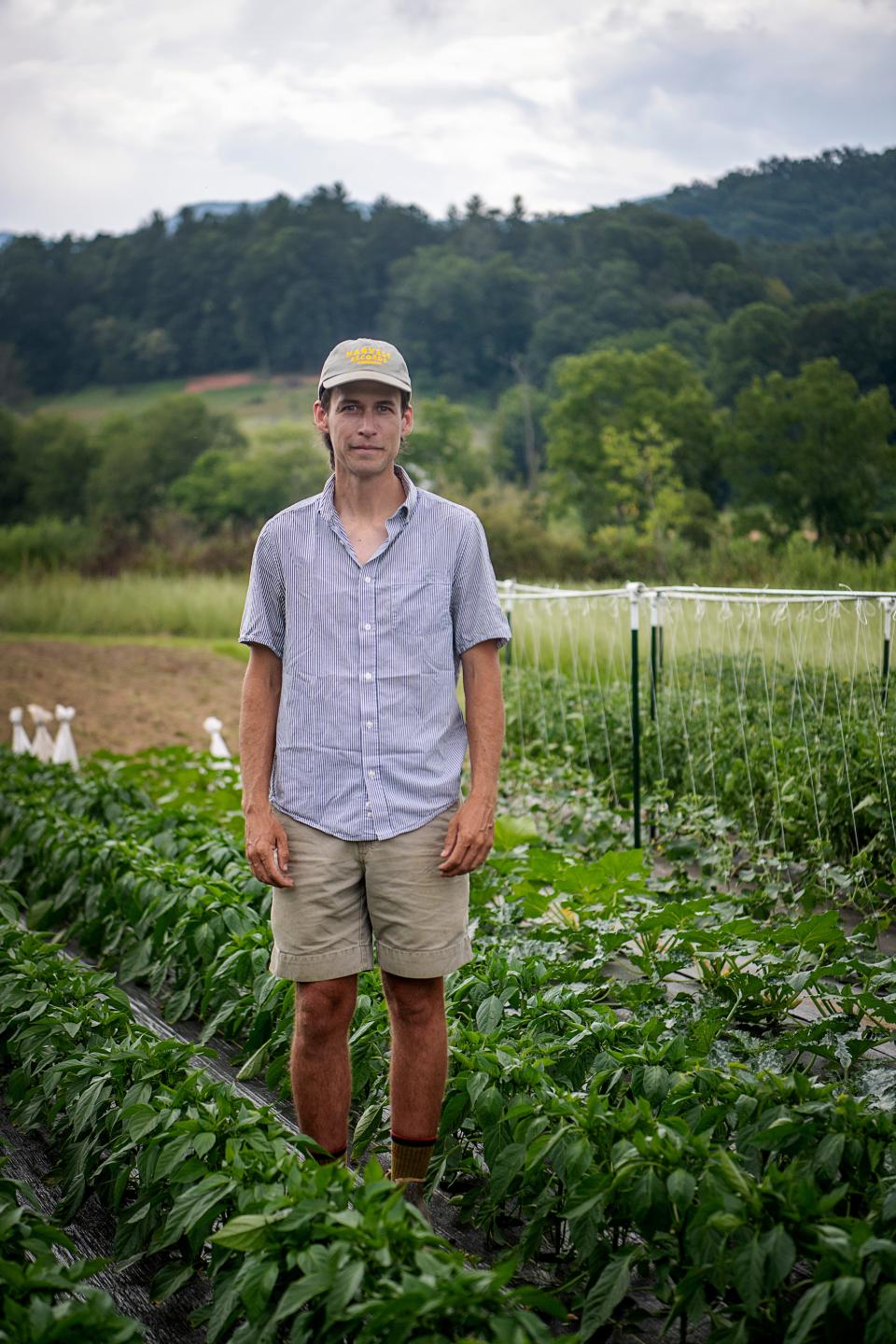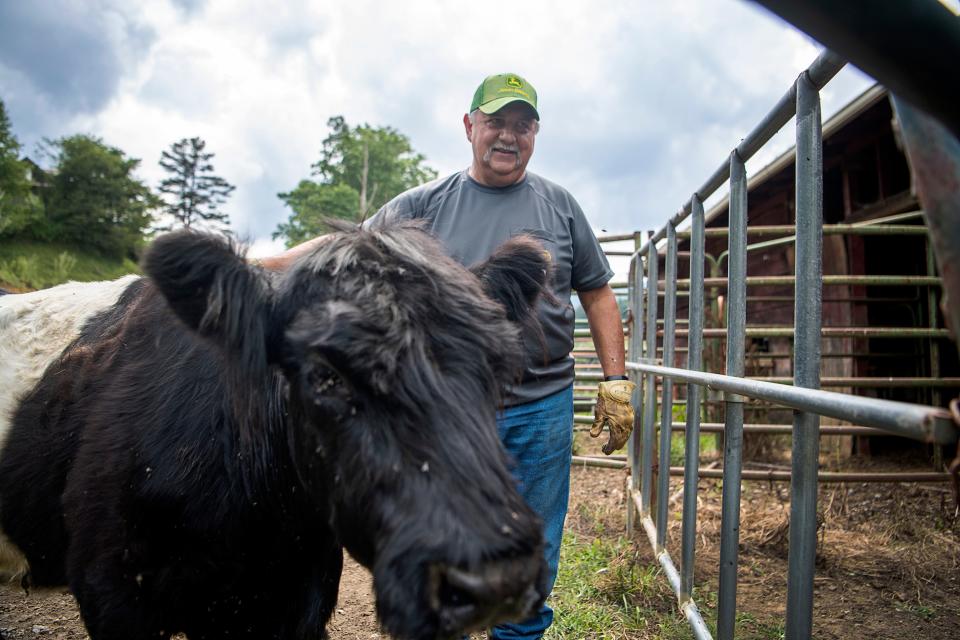Conserving Buncombe County farmland: Easements, eggplants, vineyards, old cows

SANDY MUSH – Standing amid her grape vines, on the land her family has owned for four generations, Jessica McMahan fantasized about drinking the first glass of wine from her own vineyard.
“I don’t even care what it tastes like. I just want to try it,” McMahan said to the Citizen Times July 13 in Northwestern Buncombe County. “I want to take it and walk through these vines in the evening when it’s cool and drink it and feel like I have more money than I do.”
McMahan, 30, has had years to think about what she would do with her family land. She is an only child. Inheriting the family land was only a matter of time. Others in the generation above her either don’t want the land, or don’t have someone to pass it to.
Keeping the land productive is her responsibility to her great grandparents who initially purchased it.
McMahan took on her husband Dylan’s last name, but her family, the Ducketts, own 600 acres of land in Buncombe County. In 2006, the Ducketts started putting their land in conservation easements. This is an agreement that restricts development on a parcel of land in perpetuity. Her family has 304 acres in easements. Even though landowners get a tax break for signing this agreement, and sometimes a monetary incentive from the county, relinquishing development rights is a financial sacrifice in the name of preservation, especially as the desire to build in Asheville grows.
Buncombe County politicians, government agencies and local organizations are in a tug of war, trying to manage the county’s growth while also protecting its natural environment, the farms and beauty that make this part of Western North Carolina desirable. Freezing the land in time is a preservation strategy and almost a development strategy, and McMahan is one of its agents, working to protect Buncombe County's clean drinking water, vibrant agriculture, wildlife habitat and open space.

The way McMahan has chosen to make use of her land is a form of self-expression. Choosing to help pioneer North Carolina’s burgeoning viticulture is a risk she’s willing to take.
“The biggest inspiration for me is not so much having that final product of wine, but it's doing something with this place and this farm,” McMahan said. “This is what I feel connected to. And the wine grapes are just my own spin on it.”
McMahan planted her own grapes in 2020. She grew up on her family’s farm, but managing Barbera grapes native to northern Italy is a challenge. They don’t take well to the North Carolina humidity. She is self-taught, learning from local experts, books and podcasts. Now McMahan knows her grapes. She pointed to one vine that twisted toward the sun, “vines are like we are. They do what’s easy.”
She knows her land, warning about a grown over area near the first row of vines: “There’s a groundhog hole that’s a leg breaker.”
She has endured disappointment, like when a wild turkey discovered her grapes and ate half her crop.
But she is undeterred. During the 2022 harvest, McMahan picked grapes while she was seven months pregnant.
“Farming is not for the faint of heart,” McMahan said.
She won’t taste that fantasy glass for another three to five years. The wine, made at nearby winery Addison Farms, needs to age. When she opens that bottle, the wine inside will be a time capsule, a memory of the trial and error, learning by doing, and choice to take on her family’s legacy in her own way, preserving the land, and its original intent.
A focus on conservation
Buncombe County commissioners created its farmland preservation program in a 1989 ordinance, according to the county’s website. The purpose of this program was in part to “increase the identity and pride in the agricultural community and its way of life” and to “increase protection from non-farm development and other negative impacts on properly managed farms.”
Easements are the most effective way to preserve land in perpetuity, but the county also offers programs guided by state law to allow landowners to mark their lands as agricultural in binding and non-binding agreements. Binding agreements make owners eligible for greater county cost assistance, according to Ariel Zijp, the farmland preservation manager of the Buncombe County Soil and Water Conservation District. She helps oversee the county conservation work, including its two conservation lands advisory boards.
In 2022, county commissioners set a goal of achieving 20% conservation in Buncombe County by 2030. Protected land includes land under easements and public land. Currently 78,936 acres of land are protected, roughly 18.7% of the county. They have added 2,999 acres of land in protection since establishing that goal.
The county has been able to make so much progress on their goal because they have more money to offer landowners considering an easement. In 2021, county commissioners increased the amount of money they marked for conservation easements to $750,000 per year, more than $500,000 from its prior funding level. Zijp says the main political force behind these easements is Commissioner Terri Wells, who lives in Sandy Mush. Her family agreed to an easement themselves in 2016, according to the Buncombe County Register of Deeds.
More: Buncombe wants 20% of land conserved by 2030; could cost an additional $9.5 million
Buncombe County residents elected Wells as a commissioner in 2020. Conservation was one of the reasons she ran.
“I feel a sense of urgency with farmland conservation to ensure that we continue to have our working family farms and also ensure we are protecting prime soils,” Wells said. “We need to be able to continue to farm long after the time we are gone from this earth.”
According to Jess Laggis, farmland program director at Southern Appalachian Highlands Conservancy, a local land trust, having a dedicated funding stream for easements have made it possible to accomplish projects that previously couldn’t have been completed.
Easements have become popular. According to Zijp, 35 Buncombe County landowners were interested in pursuing an easement when the Citizen Times spoke to her on July 5. Zijp said that the county chooses the parcels that are most attractive for protection by analyzing their soil quality and proximity to other protected areas among other factors. The impact of preservation is greater when there is more contiguous land.
In November 2022, voters approved a $30 million open space bond, which according to Zijp, the county has still not spent on conservation. In other words, they have more resources to work with.
“People are buying up land and they’re developing it,” Zijp said. “Once land has been developed, it is incredibly hard to take it back to its natural form.”
More: 4 scenic vineyards, wineries to visit this summer in the Asheville area
She later added, “But we can try with willing landowners (who) are interested in protecting their land to create these kind of protected regions and reserves so we can have a food production future. Clean air and clean water and all the things protected lands ensure.”
Avni Naik, who is a farmland preservation coordinator with the county, added that protected lands feed farmer’s markets and attract tourists who are beguiled by the local scenery. “That drives our local economy,” she said.
Buncombe County grants easements itself but also doles out money to local land trusts, like SAHC, which also grant easements. SAHC buys and protects land, but also has its own easement program. Whether a landowner chooses to agree to a land conservation project through Buncombe County or SAHC or another land trust is typically a matter of relationship or familiarity, according to Laggis.
Along with helping preserve land for farming, SAHC provides guidance for sustainable agriculture practices for the next generation of farmers who will work on that land. Farmers like Justin Jones.
The ultimate career pivot
Jones looks like he should be working in a coffee shop. The 36-year-old stood in his vegetable beds in Sandy Mush wearing circular sunglasses, a blue and white thin-striped short-sleeve collared shirt and yellow cutoff jean shorts. His almost shoulder-length brown hair fell behind his baseball cap.
Jones’ present is about as different as it could be from his past. He lived in the nation’s capital and worked in wholesale coffee production for a specialty coffee company, Counter Culture Coffee, until 2018. Jones got a taste for agriculture when he earned certificates in agriculture and sustainable vegetable production from Central Carolina Community College in 2015. Working in a corporate environment didn’t feel right to him.

“I always felt frustrated and stuck in certain positions where I couldn’t be as autonomous as I would like to be,” Jones said.
Jones’ autonomy is on full display in his vegetable garden where he is a contrarian and a businessman. At the moment, he is his entire workforce. He can’t compete with larger farms on vegetables like broccoli and cabbage. His niche is the unusual. He grows Japanese eggplant, gourmet mushrooms and candy red onions that he sells at the Waynesville tailgate market on Saturdays.
More: Where will Buncombe County focus conservation efforts? New maps, tool shed light
More: Amid growth boom, Buncombe eyes more than 5,000 acres in future land conservation
Jones has a single acre on a farm in Sandy Mush owned by Mark and Donna Diaz. The Diaz family has owned their farm in Sandy Mush since 2002. They farm beef cattle on a different pasture and once had hens for eggs – the hens they have now are too old to lay eggs. Donna, 61, said they’re just “pets” now. They won’t kill any of the cows that live on this pasture “I won’t kill anything, so they just die of old age here on the farm,” Donna said.
Mark grew up in the area. He and Donna worked for the Department of Defense and lived mostly in the Washington D.C. area before returning for his retirement. His parents had a small farm in the area. They agreed to an easement on the property in 2003. The decision was part financial and in part guided by their interest in preserving the surroundings.
“I had seen what happened on the farms there,” Mark, 65, said, about farms in Maryland, where he previously lived. “They got taxed so high that nobody could hang onto them.”
Then referring to Donna, he added, “Her grandparents used to have a farm and the property values up there just skyrocketed when people couldn’t even keep the farms. That’s what got me interested in conservation. You put it in the conservation easement, you get a bit of a tax break, and you don’t have to worry about somebody buying you out and developing it. It’s protected.”
He then looked out and said, “When you look at the valley, it’s something that should be kept. And I just know that if it’s not protected, it’s going to be bought out.”

The Diazes learned that Jones was looking for a place to farm through another vendor at the Waynesville tailgate market. Mark likes that Justin keeps the land productive but learns from him, too.
“I’m more of a traditionalist, old-time farmer because that’s the way we grew up. Corn, beans and taters,” Mark said. “They do a lot of stuff I haven’t even heard of. You know like that eggplant, that’s not normal looking.”
“I really enjoy watching it,” Mark added. “I learn myself.”
Jones didn’t go straight from roasting coffee to crop rotating; he needed to learn and see if he enjoyed the lifestyle. He soft-launched his farming career with SAHC's farm incubator.
Learning to farm
“Justin was the only applicant I ever had who came to us far in advance,” said Chris Link, the community farm manager at SAHC. “He called me a year and a half before he even wanted to apply.”
Link runs SAHC’s farm incubator, which gives minimally experienced farmers land in Alexander, just 20 minutes north of Asheville, equipment and help with getting off the ground. The program began in 2012.
“It’s too much for someone starting at zero,” Link said. “When people come here, I want them to know what they want to grow, have a general idea of how to grow it. Otherwise, I’ve managed people who were great farmers, but it was too much, all of it.” He called Jones an “outlier” in terms of an applicant.
SAHC required Jones to submit a business plan as part of the application. In the plan, Jones lays out how his style of farming is meant to “maximize crop yields on a minimal land area while simultaneously improving soil quality.”
The application describes how Jones would rely on biology to till the fields rather than machines, leaving organisms like earthworms, microbes and fungi undisturbed. This is a small component of Jones’ theory on sustainable growing.
Jones drilled down the revenue he would bring in for each individual bed, aspiring to between $60,000 to $100,000 per acre, a more than 40% profit. Central to his business plan was a community-supported agriculture model, which allows members of the community to pay ahead of time for a certain amount of vegetable from growers.
Jones has since departed from the CSA model, explaining that it has gotten a bad reputation for giving consumers produce that farmers can’t sell. He will soon offer a plan that allows community members to pre-pay for vegetables that they can then pick up at the Waynesville tailgate market.
“I remember being attracted to the fact that they had a lot of infrastructure available,” Jones said about the incubator program. “I think a lot of the support network and the training that becomes available to you through doing that is really helpful. I can’t imagine trying to start my business without any help.”
Jones said the incubator helped him develop his business plan and acclimate to the mountainous Western North Carolina climate. He started working on the incubator farm toward the end of 2020 and moved to the Diaz land in spring 2022.
Jones farms on land that will be conserved in perpetuity, using sustainable techniques he honed at a land trust that also administers easements. From his theory around growing to the vegetables he produces, his approach to farming is the next generation, built to help Buncombe County sustain its increasing popularity.
At the Waynesville tailgate market, members of the community approach him, asking him how to treat a certain vegetable in the kitchen or how to grow it. He speaks about the vegetables as if he has been growing them for decades.
McMahan is a bit further away from interacting with customers. According to Matthew Duerstock, the vineyard director and winemaker at Addison Farms, she is poised to join the current generation of North Carolina winegrowers determined to break out of their reputation of making overly sweet muscadine.
“North Carolina has had a pretty terrible reputation for sweet wines,” Duerstock said. “Muscadine, really sugary wines. But as that movement is taking off, we’re in this second wave of vineyards in North Carolina.” He notes that he personally likes muscadine and is working with A-B Tech Community College to make a wine from that grape that is more widely appealing.
Duerstock finds McMahan’s approach to growing inspiring because she embraces the heritage of the land and preserves it through the way she grows. He says that she puts in “hard work, time and intentionality.”
He sees the potential in North Carolina wine because, like the Champagne region of France, North Carolina has a short growing season. The sugars in the grapes don’t develop so they are very acidic, which he says translates well to sparkling wines.
McMahan’s wine might not taste good. Growing grapes may not be right for her land. But even if she doesn’t fulfill the potential Duerstock sees in North Carolina wines, her land will have another opportunity to produce for the agricultural economy, because building on it is not an option.
Standing in front of her grapevines, looking out on the valley and beside her 7-month-old daughter, Natalie, who she carried one year ago while picking her harvest, McMahan said, “They’re not making any more land."
Mitchell Black covers Buncombe County and healthcare for the Citizen Times. Email him at mblack@citizentimes.com or follow him on Twitter @MitchABlack. Please help support local journalism with a subscription to the Citizen Times.
This article originally appeared on Asheville Citizen Times: Conservation easements help protect precious Buncombe County farmland

